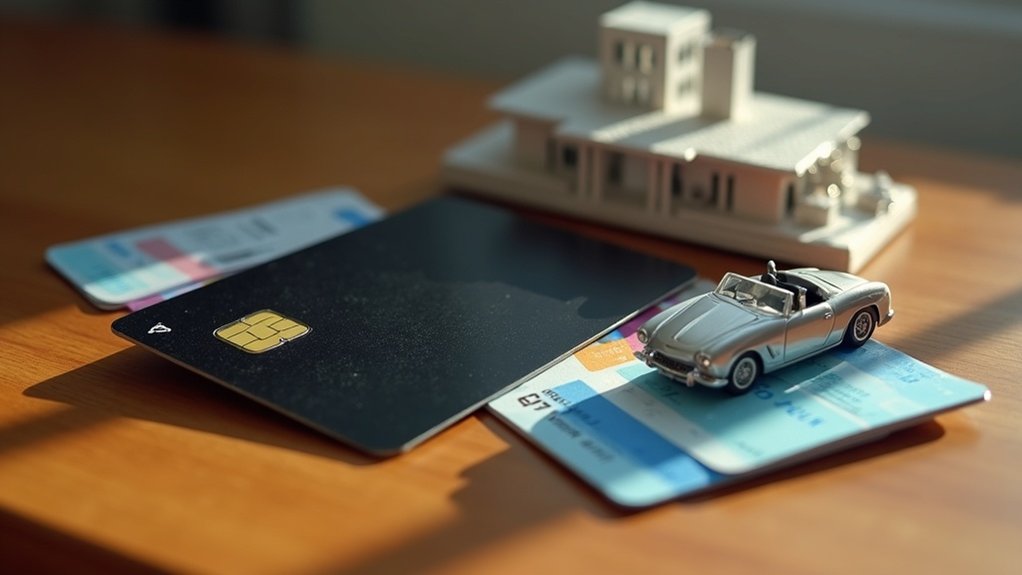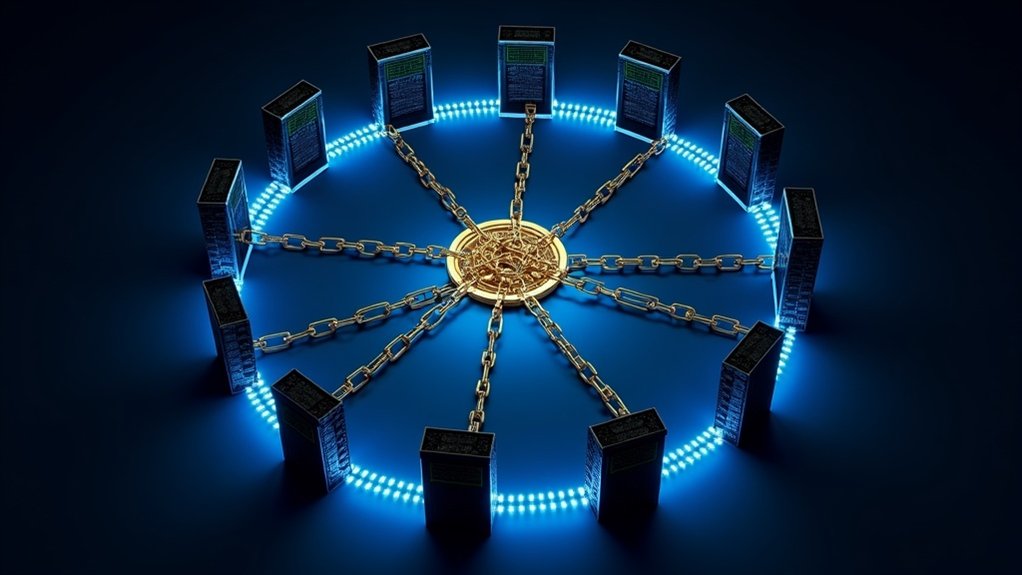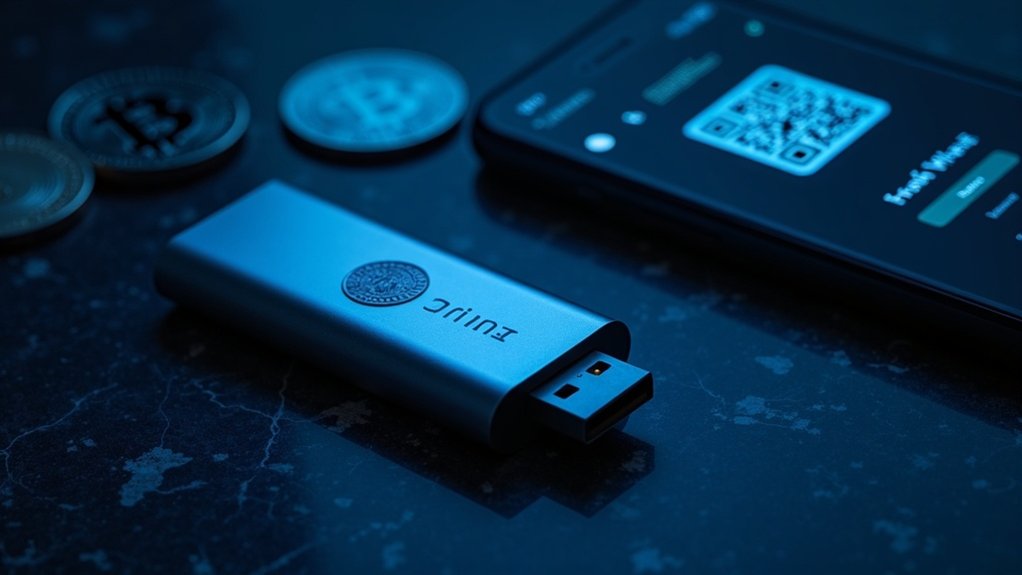Getting a Bitcoin address is surprisingly simple. You’ve got options. Download a software wallet like Electrum or Trust Wallet for immediate access. Need more security? Grab a hardware wallet like Ledger. Exchanges work too—Coinbase, Binance, whatever. Each method involves trade-offs between convenience and security. Your address will look like a random string of 26-35 characters starting with 1, 3, or bc1. The rest of this guide unpacks essential security details.
Steering through the world of Bitcoin starts with a single, essential step: getting your own Bitcoin address. It’s not rocket science. Just a string of characters that lets you receive digital money. Think of it as your digital mailbox for crypto.
Bitcoin addresses aren’t pulled from thin air. They’re created through a series of cryptographic processes. First, a private key generates a public key. Then comes the hashing – SHA-256 followed by RIPEMD-160. Add a version byte, toss in a checksum, and convert to Base58. Voilà! Your Bitcoin address is born. Bitcoin addresses typically range from 26-35 characters long and are prefixed with 1, 3, or bc1 depending on the address type.
Sounds complicated? That’s why normal people use tools.
The easiest route? Crypto exchanges. Sign up with Binance, Coinbase, or Kraken. Navigate to the deposit section, select Bitcoin, and there it is – your very own address. The catch? The exchange controls your private keys. Not your keys, not your coins. Period.
For the security-conscious, hardware wallets are the gold standard. Ledger, Trezor – pick your poison. Follow the setup instructions, connect to the companion app, and generate addresses without exposing your private keys. They’re not cheap, but neither is losing your life savings to hackers. While miners solve proof of work puzzles to validate transactions, your wallet keeps your funds secure.
Software wallets offer a middle ground. Download Electrum or Trust Wallet, create a new wallet, and you’ll get an address instantly. They’ll give you a seed phrase too – a bunch of random words that can recover your wallet. Write it down. Don’t take a screenshot. Don’t email it to yourself. Seriously.
Tech-savvy users might prefer coding their own solution. With libraries like bitcoinjs-lib, generating addresses programmatically is straightforward. Just a few lines of code and you’re set. Having multiple keypair addresses for development and testing purposes is especially important when building Bitcoin applications.
Remember: addresses come in different flavors – Legacy, SegWit, Native SegWit. Each has its perks.
And always double-check addresses before sending funds. One wrong character and your Bitcoin vanishes into the digital void. Forever.
Frequently Asked Questions
Can I Have Multiple Bitcoin Addresses?
Yes, users can have multiple Bitcoin addresses. Most wallets support this feature, though it might need enabling.
Multiple addresses enhance privacy by preventing transaction linking. They’re useful for separating funds by purpose and improving tracking. Some platforms allow up to 20 deposit addresses. Smart move, really.
All addresses typically link to the same seed phrase, maintaining unified wallet control despite the diversity. Many experts consider address reuse poor privacy practice anyway.
What Happens if I Lose My Bitcoin Address?
Losing just a Bitcoin address? No biggie. Addresses are public information anyway.
The real catastrophe is losing private keys or recovery phrases. Without those, kiss those precious coins goodbye. Forever. The blockchain doesn’t care about your sob story—no central authority exists to help.
Professional recovery services might assist with forgotten passwords if you still have key files, but they’re pricey and risky.
Bottom line: addresses are replaceable, private keys aren’t.
Are Bitcoin Addresses Case-Sensitive?
Bitcoin address case sensitivity depends on format.
Legacy addresses (Base58Check) are completely case-sensitive. Mess up one capital letter? Transaction rejected. Period.
Newer Bech32 addresses are case-insensitive. Type it ALL CAPS or lowercase—doesn’t matter.
This distinction matters. The odds of creating a valid-but-wrong address by mistyping case is about 1 in 4.29 billion for legacy addresses.
Smart users never type addresses manually. They copy-paste or scan QR codes. Always.
How Secure Are Bitcoin Addresses Against Hacking?
Bitcoin addresses themselves are nearly impossible to hack. They’re just public keys, after all.
The real risk? Your wallet security.
Hackers don’t crack the math—they target humans. Phishing, malware, keyloggers—that’s where they strike. Your private keys are the crown jewels they’re after.
Hardware wallets beat software ones, hands down. Keep seed phrases offline, use 2FA, and avoid sketchy Wi-Fi.
Remember: transactions are irreversible. Once your Bitcoin’s gone? It’s gone forever.
Can My Bitcoin Address Be Traced Back to Me?
Yes, Bitcoin addresses can absolutely be traced back to their owners. Despite the pseudonymous nature, blockchain’s public ledger exposes every transaction ever made.
Address clustering links multiple addresses to single users. When you interact with exchanges requiring KYC, game over. Your identity gets tied to your transactions.
Privacy techniques like mixers exist, but they’re not foolproof. Law enforcement agencies have gotten pretty good at this tracing game.
Privacy? More like privacy-ish.









